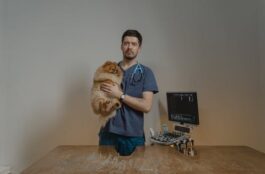
Does your furbaby have routine checks, timely vaccinations, and preventive care? Taking your pet to the vet isn’t just for when they’re unwell. Regular veterinary care plays a crucial role in preventive pet healthcare – let’s delve into why.
The Role of Regular Veterinary Visits
Every pet parent should realize that a consistent vet regimen is paramount in keeping their pets hale and hearty. Fido or Whiskers may seem perfectly fine, but early detection of latent health issues is vital to protecting their well-being.
Routine Check-ups
A significant part of regular veterinary visits is routine check-ups. Your pet may appear healthy, but ongoing vet appointments can disclose issues that are not readily perceptible, such as gastrointestinal problems, skin conditions, or urinary troubles. Stepping in early can help manage these ailments effectively.
Vaccinations
Vaccines shield our pets against a myriad of diseases. Regular vaccinations form a potent preventive healthcare measure. Veterinary professionals administer these inoculations based on your pet’s age, lifestyle, and risk factors, ensuring tailored care for your beloved pet.
Responding to Illness or Injury
Detecting signs of distress or discomfort in our pets can be challenging. Regular veterinary care can identify anomalous behavioral signs of illness or injury, promoting swift intervention and treatment.
An Insight into Pet Internal Medicine
Internal medicine veterinary professionals step in when your pet requires more than routine care. Specializing in diagnosing and treating severe or chronic ailments, these experts provide advanced medical care, lending you peace of mind.
Pragmatic Preventive Care Measures
Administering heartworm and flea protection, ensuring dental hygiene, and adhering to a balanced diet all contribute to your pet’s preventive healthcare. Regular vet visits facilitate a comprehensive view of your pet’s health, offering suitable preventive protocols.
Specific Health Issues
Our furbabies can suffer from various health issues, with some common ones being gastrointestinal disturbances, skin conditions, and urinary disorders. Regular veterinary care can detect these problems early, enabling more effective treatment.
The Perks of Pet Wellness Plans
Learn more about pet wellness plans, essentially preventive pet healthcare packages. Comprising annual physicals, vaccinations, and lab work, these plans ensure your pet’s health management is proactive and comprehensive.
Specialized Care
As every pet parent knows, emergencies can happen without warning. Regular veterinary care helps nurture a relationship with a veterinary team that can intervene during these crises. A result of such care could be employing animal critical care in Carrollton, GA, offering immediacy during emergencies.
What to Expect During a Vet Visit
A typical vet check-up involves reviewing your pet’s medical history, a thorough physical examination, and diagnostic tests if required. Discussions regarding nutrition, behavior, and potential health issues also occur, furnishing you valuable information to ensure sustained pet health.
During a typical visit to the vet, it is likely that the following procedures will be undertaken:
- Registration: This is the initial part where you confirm your details, your pet’s details, and the reason for your visit.
- Weight Check: Your pet will be weighed as this is a basic indicator of health.
- Medical History Review: The vet or veterinary nurse will review your pet’s medical history with you, inquire about any changes in behavior, diet, or general health, and fill in any gaps in information as necessary.
- Comprehensive Physical Examination: The vet will conduct a comprehensive physical examination of your pet. This might include checking the eyes, ears, skin, teeth, respiratory system, cardiovascular system, abdominal organs, and musculoskeletal system for any signs of disease or abnormality.
- Diagnostic Tests: If necessary, the vet may suggest diagnostic tests, such as blood tests, urine tests, X-rays, or ultrasound. These tests can help identify problems that are not visible during a physical examination.
- Discussion: The vet will discuss their findings with you after the examination and tests. If any medical issues are present, the vet will explain the diagnosis, prognosis, and treatment options.
- Treatment or Preventive Care: Based on the vet’s findings, your pet may receive treatment for a specific issue or preventive care, such as vaccinations, flea, tick, and worm treatments.
- Advice and Education: The vet will advise on how to maintain or improve your pet’s health. They may discuss diet, exercise, dental care, behavior, and any potential health issues to be aware of, given your pet’s breed, age, or lifestyle.
- Checkout: Once the visit ends, you’ll check out, schedule any necessary follow-up appointments and pay for the services provided.
Ensuring Continuity of Care
Establishing a long-term relationship with a care provider is vital to ensure effective preventive pet healthcare. This lets veterinary professionals get acquainted with your pet’s unique health profile, offering more personalized care in return.
Conclusion
Proactively prioritizing your pet’s health by engaging in regular veterinary visits isn’t merely beneficial; it’s essential. It significantly aids in preventive pet healthcare, helping ensure your four-legged family member leads a long, happy, and healthy life. Regular veterinary care – pet parents want the best for their furbabies.

